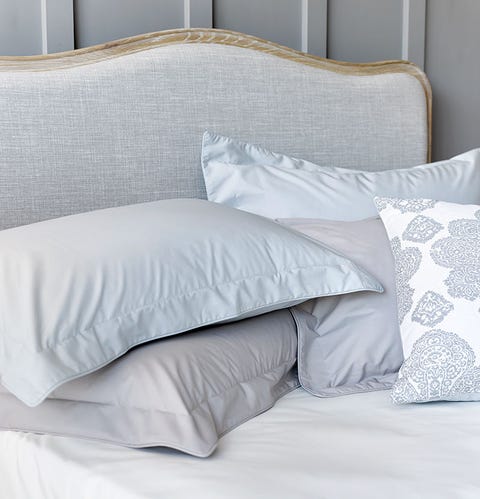How to Get Newborn to Sleep at Night
Created by Good Housekeeping for M&S
Have you ever found yourself struggling to get to sleep at night, even though you're exhausted?
There's nothing more frustrating than counting sheep when all you want is a full eight hours, but sometimes a deep slumber isn't so easy to slip into. From using your mobile phone before bed to getting too cosy under the covers, we asked the experts about the most common sleep-stealers and what you can do to finally drift off.
1. Using your phone late at night
'Too much blue light (the kind emitted by digital screens) disrupts melatonin production for up to four hours', explains Dave Asprey, founder of Bulletproof. So, stop looking at bright screens for up to two hours before bed and turn out or dim all bright lights at least 30 minutes before you hit the sack. Even small lights on electronic devices can disrupt your natural sleep cycle, so switch off at the socket, cover blinking lights with tape and try charging your phone in another room.
2. Getting frustrated that you can't sleep
This might seem counterproductive, but if you aren't asleep 20 minutes after settling down, you should get up and 'do something practical that you need to do but don't enjoy' in a dimly lit room suggests Gareth Hughes, a psychotherapist at the University of Derby. Read that boring work report or match up your socks, but don't reward yourself with food or drink as 'this will motivate your brain to try to get you out of bed again'.

3. Sleeping on the wrong mattress
Make your bed as comfortable as possible. Invest in Egyptian cotton bed linen, take time to choose the right pillow fillings and replace your unsupportive mattress with one that's been designed with the ultimate night's sleep in mind. Marks and Spencer's premium mattresses are handmade in an award-winning factory in Somerset, using time honoured traditional techniques to suit and support every customer.
4. Being stressed
Feeling overwhelmed can be a common reason why you can't drift off. Lisa Artis, spokesperson for The Sleep Council, advises 'whether it's worries over work, finances, health or family, the first step is to write down any worries or to-do lists to clear the mind. Next, practice some deep breathing exercises, meditation or even gentle yoga to relax the body.'

5. Being too hot
Bedroom temperature can be a significant factor in poor sleep, explains Matthew Green, Nuffield Health's Regional Clinical Lead Physiologist. Getting too cosy under the covers can actually keep you from slumber, so resist extra blankets and 'allow your body to adjust to your bedroom's temperature before going to sleep'. Keeping your body temperature between 15-17 degrees Celsius is ideal. To help beat the heat, you could invest in some M&S' Comfortably Cool pillows which have pure cotton covers and a clever eco polyester filling that draws moisture away from your body while you sleep, helping to regulate temperature.
6. Eating the wrong foods
Rethink spicy or fatty foods if you want a decent night's sleep. 'Capsaicin, an active ingredient found in chilli peppers, can change your body temperature and affect sleep' according to Push Doctor's nutritionist Will Hawkins, 'while the hypocretin chemical in highly saturated fat foods can be detrimental to your sleeping patterns'. Instead, load up on salmon, tuna and cherry juice, which help create the natural sleeping aid hormone melatonin.

7. Drinking alcohol before bed
Drinking alcohol close to bedtime makes you more likely to go straight into second-stage deep sleep, missing out on first-stage REM sleep. Although you'll fall asleep quickly, the sleep won't be as deep and your disrupted cycle could mean you wake up feeling exhausted. 'Even a couple of drinks can affect the quality of your sleep' explains Paul Wallace, Chief Medical Adviser to Drinkaware, so limit your intake if you're hoping for a restful night.
8. Clock-watching
You can retrain your body to sleep well by going to bed and getting up at the same time every day – even at the weekend, asserts psychotherapist Gareth Hughes. Resist lie-ins and your body will adjust to a regular pattern after a couple of weeks. Lisa Artis also urges you to take clocks out of the bedroom: 'Constantly clock watching can have a detrimental impact on sleep and anxiety at how many hours you have left to sleep. Remove the clock from the bedroom or cover it.'
9. Having low blood sugar
It's recommended that big meals are eaten more than three hours before bedtime, but a snack is actually encouraged. 'A great bedtime snack could be oatcakes and cheese, peanut butter on wholemeal toast or a small bowl of low sugar cereal' explains Lisa Artis. This way you won't wake up with low blood sugar, craving a snack.
Head to M&S for more tips and advice on getting the perfect night's sleep
This content is created and maintained by a third party, and imported onto this page to help users provide their email addresses. You may be able to find more information about this and similar content at piano.io
How to Get Newborn to Sleep at Night
Source: https://www.goodhousekeeping.com/uk/health/health-advice/a566908/how-to-get-to-sleep/